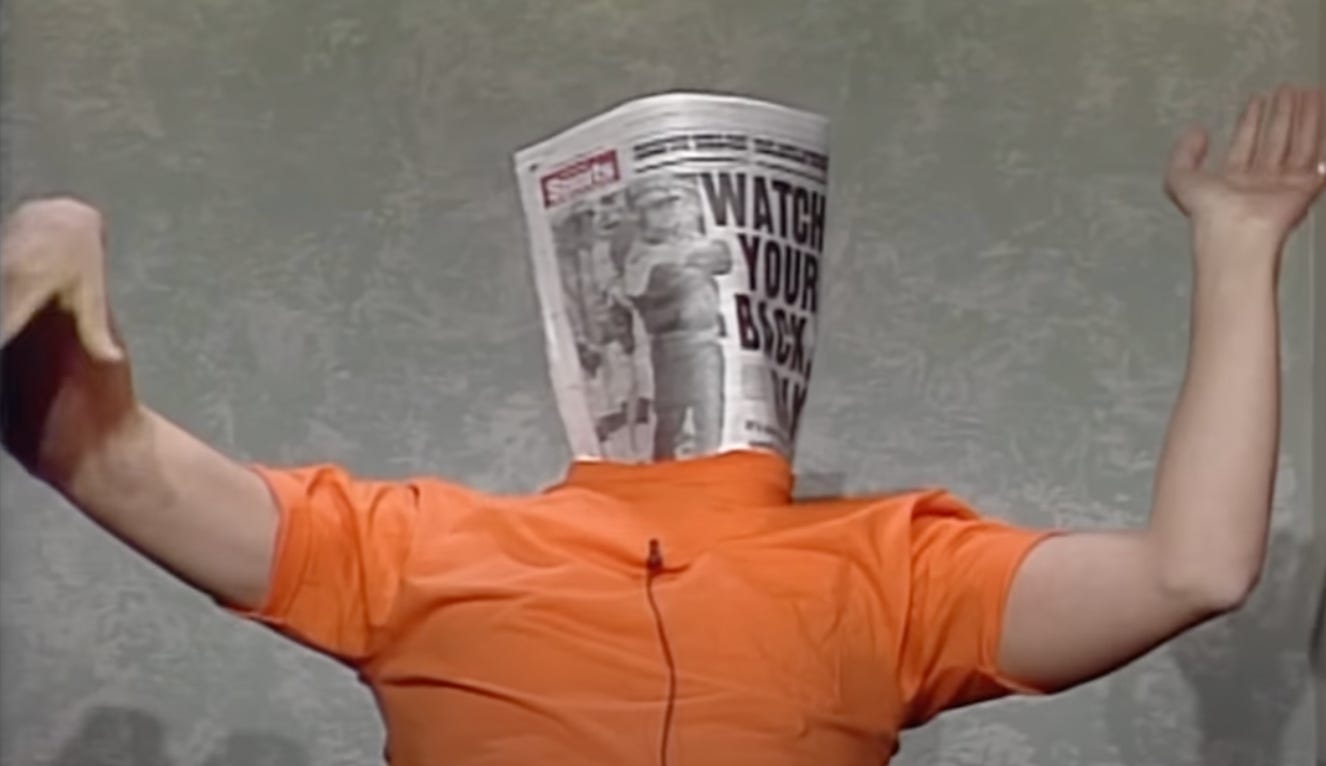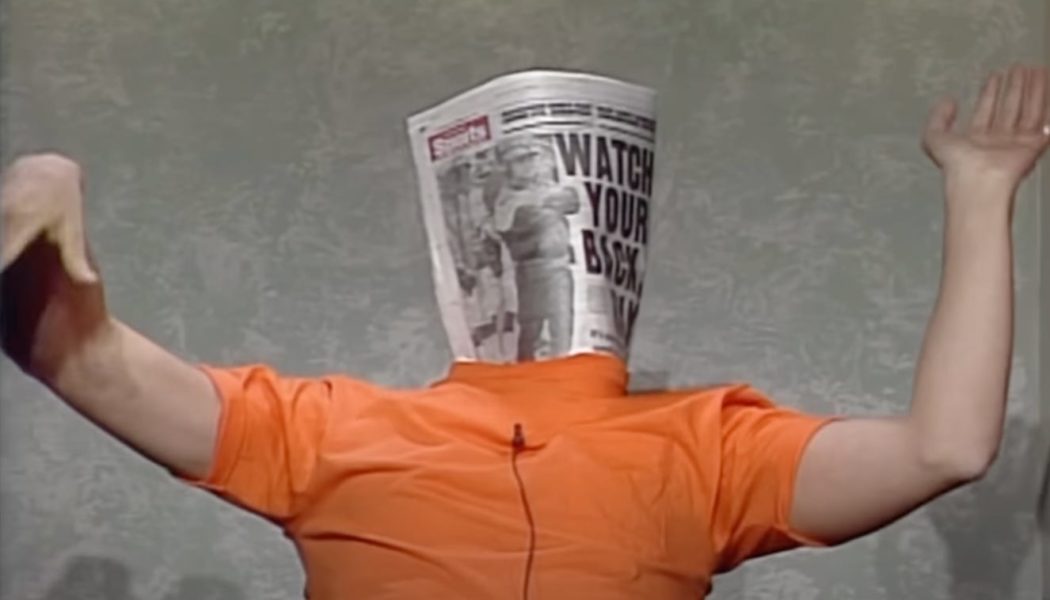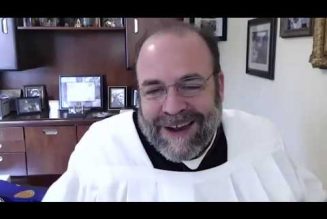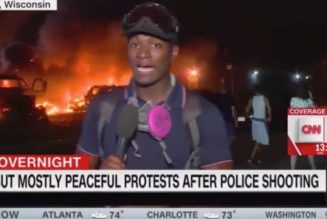
Happy everybody,
Happy Halloween!
In fact, let’s start there. There’s no way around it, today is Halloween, and you’re reading The Tuesday Pillar Post.
I know there are Catholics who are uncomfortable with the celebration of Halloween, but I’m not one of them. I love Halloween, actually.
First, Halloween is obviously a liturgical holiday, preceding our commemorations of the saints and angels on November 1, and our day of remembrance for the faithfully departed — the poor souls in purgatory — the next day.
In our family, we talk about Halloween in the context of death — we know that death has no power over us, because we have life eternally in Jesus Christ.
So on Halloween, with the ghosts and skeletons, we remind our children that we can laugh at death, affectionately, as our macabre sister, who will come for us, but whom we need not fear.
Second, Halloween is fun. Kids dress up like heroes and villains, families trick or treat together, neighbors open their doors and talk to each other. Halloween is a community day, in an America ever more short on them. That’s something worth celebrating.
But, of course, there is also the ever-more gory side of Halloween, with a growing number of houses on our trick-or-treat route turning from the spooky to the gruesome and horrifying.
I hate horror movies, and I hate Halloween’s turn to graphic gore. I tend to think that turn comes from a people who don’t know the meaning of their own deaths — who are terrified by death, actually, and who lean into that terror at Halloween, as a way to grapple with a sense of powerlessness before the mystery of suffering, death, and what comes after.
We’re not terrified of suffering or death. We know they have meaning. We know they precede resurrection. But we’re perhaps reminded at Halloween how many of our neighbors are unfamiliar with the Gospel’s promise — how many are gripped by the truest terror — not goblins or ghouls, but despair.
Look, I’m not saying that trick-or-treat tracts are the way to do it, but the contemporary, gory, nihilistic version of Halloween is a probably good reminder of how many people need the Gospel. Which means that we, of course, should be willing to offer it.
With that said, if you don’t yet have plans for a Halloween costume, here are a few good ideas from Adam Sandler:
The news, in the ‘key of synodality’
At The Pillar, the news reporting of the past few days has mostly centered around the synod on synodality, as we wrap that story up for a while, and aim to focus on other important things happening in the life of the Church.
At nearly 21,000 words, the text emphasizes that it is not a “final document” for the synod, but rather, “a tool at the service of ongoing discernment.”
If you want to know what that tool has to say, read our report, right here.
—
Next, we’ve put together a comparative analysis of 10 significant ways in which the synod’s “interim report” was changed from the draft document presented to synod delegates last week.
When the draft synod document was distributed last week, delegates proposed more than 1,000 amendments to its text. Delegates, for example, urged dropping the notion of a “permanent synod of bishops” in Rome, with members elected by bishops’ conferences.
They also urged that the synod become much more precise in its language regarding concepts like the sensus fidei.
So which proposals were accepted — and what do they have to say about the synod assembly, and its views on the Church’s life?
Check out our report on 10 significant changes, right here.
—
While transparency has been an emphasis of the synod on synodality, the Vatican has not responded to The Pillar’s questions about one part of the synodal process: How much it costs.
While I was in Rome, I tried to learn about synod costs through official channels, as well as I could. But I didn’t get very far.
I began with enquiries at the Vatican press office, trying to find out who I might interview about the synod’s costs.
When I got there one morning and asked my question, I was asked to wait for a while in the lobby, before a press office staffer told me that his office wasn’t sure who I should interview.
He said I should visit the Vatican office of the synod secretariat, to ask for the name of the person who could speak with me about finances, and then — having obtained the name — I should follow the ordinary press office protocols for requesting an appointment with that person, to conduct an interview.
So I visited the synod secretariat office, just down the street on the Via della Conciliazione.
But upon arrival at the secretariat’s building, I was informed that I could not request any information without an appointment.
I tried to explain to a receptionist that I was there to find out the name of the person with whom I should make an appointment, and I even showed the building’s receptionist a little note I had from the press office, along with my Vatican journalism credential.
But I was sent back to the Vatican press office.
When I got there, I explained my predicament, and waited in the lobby for a while, before a staffer suggested that I email his office with a request for assistance in finding the name of the person with knowledge of the synod’s finances, so that I might subsequently request an interview with that person.
I did exactly that.
But my email — and subsequent follow-up emails — did not receive a response.
So it has been a bit of a challenge to get clarity on the synod’s costs.
But sources have explained that a lot of costs for the month-long meeting this October have been borne by bishops’ conferences, rather than the Vatican itself.
While the Vatican’s costs probably amount to several hundred thousand euro — in the middle of a “particularly serious economic crisis” for the Apostolic See — officials have not yet published any figures.
Still, here’s what we do know about the financial costs of synodality.
—
Next on the synod, an analysis from Ed on what will happen now.
Ed argues, I think convincingly, that “the true importance of the synodal halftime report may lie less in what it concluded, and more in the debate it generates, during the year-long break before the October 2024 session of synodality synod.”
In short, he says, the synod on synodality’s interim document may be mostly about moving the ecclesiological Overton window ahead of next year’s session.
Could that be?
And here’s the rest of the news
Ok. There are other things happening in the life of the Church right now.
First, our Latin American correspondent Edgar Beltran reports on the 12 priests deported from Nicaragua to the Vatican City State this month.
Who are they? Why were they deported? And what do we know about Nicaragua’s ambiguous claim to be in “negotiations” with the Holy See?
—
Next, an interview I am very excited to share with you.
Cardinal Willem Eijk of the Netherlands has gained a reputation in recent years as one of the most insightful and pastorally engaged diocesan bishops in Europe.
Cardinal Eijk had an extensive conversation with The Pillar last week, about evangelization, secularization, pressing moral and social issues, and the effects of dwindling Church attendance in the Netherlands.
But, for me, the most interesting parts of his interview were the parts in which he discussed his own source of hope:
“I believe in Christ, and Christ will never let down his Church. That in the first place.
Even when the Church declines in the whole world – and we see that the number of Catholics will dwindle around the globe, not only in Holland – that does not make a difference to me.
My faith in Christ will remain the same.
I have a deep joy at the bottom of my soul because Christ called me to be a priest. Nobody can take that joy from me. Nothing. That joy remains.
Even when the number of churchgoers is dwindling, the joy of the priesthood remains in me.
So, I’m very thankful that God called me to represent Him in person, especially in the Eucharist and in the sacrament of reconciliation.
Again, what will remain in Holland? A small, but strong Church, because the people who still remain in the Church and continue to go to Mass every Sunday are convinced Catholics.”
This is a long interview. It goes in-depth on a lot of subjects — including the pastoral challenges of parish mergers and church closings. But all of it is worth reading.
Once more, on synodality
Since the synod on synodality’s “interim report” was published on Saturday, a number of prominent synod boosters and participants have expressed disappointment that the synod didn’t “accomplish” what they hoped it would, or that it hadn’t taken enough steps to advance the agendas they’d brought to table.
As it happens, I’ve got some lived experience with synodality. So I’d like to offer a little bit of advice, if I can.
Before I became a journalist, when I was working in the chancery of the Diocese of Lincoln, Nebraska, I was appointed as a regional representative to the National Advisory Council, a little-known body established by the USCCB more than 50 years ago, to provide regular consultation and advice to the bishops of the United States.
They call the National Advisory Council “the NAC,” which is confusing, because that’s also the name of our American seminary in Rome.
For now, that NAC — the more famous one — is not what I’m talking about.
The (less famous) NAC is composed of some 40 or 50 members — laity, priests and deacons, religious brothers and sisters, and bishops — who meet twice a year as equals, with an elected chairperson, to discuss the agenda of upcoming USCCB meetings, the issues the bishops are working on, and the needs of the Church as the members themselves see it.
Serving on the (less famous) NAC was one of the most edifying experiences I’ve had in my adult life of serving the Church.
The membership is broad, most appointed by local bishops as regional representatives, but some representing groups like the Leadership Conference of Women Religious, the Conference of Major Superiors of Women Religious, and the Conference of Major Superiors of Men.
Some members are “professional Catholics,” like me, and some are people working in ordinary fields in the world, or raising their children.
The perspectives are wildly diverse. During my time the membership of the NAC included people from just about every ecclesio-political tribe you could name.
And the work is both difficult and important — members meet for several days, sit at round tables in small groups, and try to come up with recommendations to the bishops about the issues they see as germane to the Church’s life.
Sometimes there is consensus, and sometimes there isn’t.
But I appreciated about the NAC that people from extraordinarily diverse viewpoints and experiences came together to spend several days praying together, talking together, taking meals together, and drinking cocktails together.
The sense of Christian communion was extraordinary, and — in my time — it was rooted in the daily sacrifice of the Mass, which began the work each day.
And I learned something important during my time on the National Advisory Council. When I started, I perceived that the gathering would be a kind of parliamentary affair. I tried at first to identify like-minded members, to whip votes in the direction I thought they needed to go.
It was good for me to learn that the whole thing proceeded much more in a spirit of prayer, and that the members seemed actually convinced that listening to people with whom they disagreed would be good for them, and good for the Church.
I realized that Catholic doctrine wasn’t threatened if I heard what somebody had to say — even if it didn’t mean I’d trust those people to catechize my children anytime soon.
Sometimes a vote went the way I hoped it would, and sometimes it didn’t. But again, the whole point was to give the bishops an accurate sense of what the members of this group thought — it didn’t mean that what they thought was correct all the time. And the bishops were smart enough to know that.
Maybe those lessons seem obvious to you, but to a young JD, they were important. In that sense, I think the National Advisory Council helped me grow in Christian maturity.
While some people would have you believe that the Church hasn’t been “doing synodality” before Pope Francis began emphasizing it a couple of years ago, I disagree.
My experience of the National Advisory Council was an experience of synodality, even before the term was in vogue. And I’m deeply grateful for it. I am most especially grateful that the experience was a locus from which one formed genuine Christian friendships over serious theological disagreement.
And I saw, in Rome, that the delegates of this month’s synod on synodality seem to have had a similar experience. I think they were sincere when they said the Holy Spirit was in the room.
In fact — of course the Lord was there: “Where two or three are gathered in my name, I am among them.”
Now, some of you have been suspicious since the beginning, but because my lived experience tells me that it can be of importance to the Kingdom, I have been open to the emphasis on “synodality” in the Church in recent years.
At the National Advisory Council, it was clear that our job was to provide some sense to bishops about what a (presumably) representative sample of practicing Catholics thought about things. Of course, that sense was limited — three or four days of work would be compacted into a short report prepared for the bishops, and not everything could be captured, obviously.
In that sense, the stakes were kind of low, in terms of output from the National Advisory Council. Despite their insistence to the contrary, I’m not convinced that opinions of the NAC swayed the deliberations of the USCCB very often.
But that doesn’t mean it was a waste of time — it wasn’t precisely productive, but the biggest value I saw was that participants were themselves formed, and that formation had impact on their life and ministry.
Soon after I began my time on the NAC, I was appointed to be the coordinator of a “dialogue” with an interdicted group in the diocese where I worked, with the aim of exploring their reconciliation to the Church.
I think my time on the NAC helped me to do that. And I think it also helped me when I was appointed to explore with a small traditionalist group of clerics — who had broken with the Church’s hierarchy — whether they might return to the full communion of the Church.
The NAC’s methodology, and the lessons it imparted, are, I think, important.
But the danger of the current synodal moment is allowing synodality to become “self-referential,” as Pope Francis puts it.
See, there were ground rules to the proceedings of the National Advisory Council.
The NAC did not confuse itself with the Church’s magisterium.
The NAC did not make recommendations that contravened Catholic doctrine. Instead, the teachings of the Church were taken as an a priori reality — it was not the job of the National Advisory Council to presume to have some insight into sacred doctrine. It was instead the body’s job to reflect on how that doctrine should guide the life of the Church.
Nor did the NAC imagine that it could compel the bishops to do anything. It took for granted the hierarchical constitution of the Church, and the legitimate authority conferred upon bishops at their episcopal consecrations.
That baseline, I think, made the advice useful, made the deliberations focused on actually serving the Church, and better allowed for the participants to hear the voice of God.
People who found the ground rules difficult realized quickly that the NAC wasn’t for them.
The clear, unspoken, but obvious presumptions were this: The voice of God does not contradict the teachings of the Church. It is not the place of some small, quasi-representative body to presume to discern the “development of doctrine.”
And, most important — the spiritual conversations of the NAC were not an end in themselves. They were focused on how the Church might better witness to the Gospel itself.
—
The most important caution to the current synodal moment is that synodality not be taken to mean more than it actually does — that the deliberations of the synod should not be taken as the voice of the Church, still less the voice of God. That there should be recognition that the process itself can be flawed, can be manipulated, and — even at its best — can produce only fairly limited insight.
The synod is not a reflection of the universal sense of the faithful. It is not an ecumenical council.
And there are a few dangers now.
One, that people with legitimate criticisms of the synod will toss out the baby with the bathwater, and eschew the idea that coming together for spiritual conversation is a good thing.
The other is that people who have had a positive experience of the synod will make too much of it — earnestly or otherwise — and lose sight of its limited scope of impact.
Other dangers:
—That synod organizers themselves will act in bad faith, or that they’ll allow those acting in bad faith to hijack the thing.
— That synodality will be seen as an end in itself. An alternative to evangelization, and the primary sense of ecclesial communion.
— That the deliberations will be weaponized, by people inside or outside the Church, to suggest that disagreeing with the synod’s interim document is somehow disagreement with the Church itself.
That idea is theologically silly.
It will also undercut legitimate and potentially useful efforts to expand the Church’s engagement with the baptized.
Here’s my point: We actually need, very much, to listen to one another. We need to pray with one another. We need to discern the will of God together.
The synod, Pope Francis says, is meant to teach that.
The real enemies of synodality are the ones who recast the synod as something more than it really is.
Ok — with all that said, here’s my promise to you.
There is a lot happening in the life of the Church right now. A lot that matters a great deal. We’re going to take a break from talking and writing about synodality for a little while, unless the news absolutely requires us to do so.
I expect you won’t be too disappointed.
—
Happy Halloween. Don’t be afraid of death. Please save me any excess 100 Grand Bars that your children happen to collect.
If you can, please become a paying subscriber to The Pillar. Help us do more serious journalism about the life of the Church. We make journalism worth paying for:
Please be assured of our prayers. And please pray for us. We need it.
Yours in Christ,
JD Flynn
Editor-in-chief
The Pillar
Comments 11
Services Marketplace – Listings, Bookings & Reviews






![My Struggle Session at Stanford Law School [WSJ Paywall]…](https://salvationprosperity.net/wp-content/uploads/2023/03/my-struggle-session-at-stanford-law-school-wsj-paywall-327x219.jpg)
